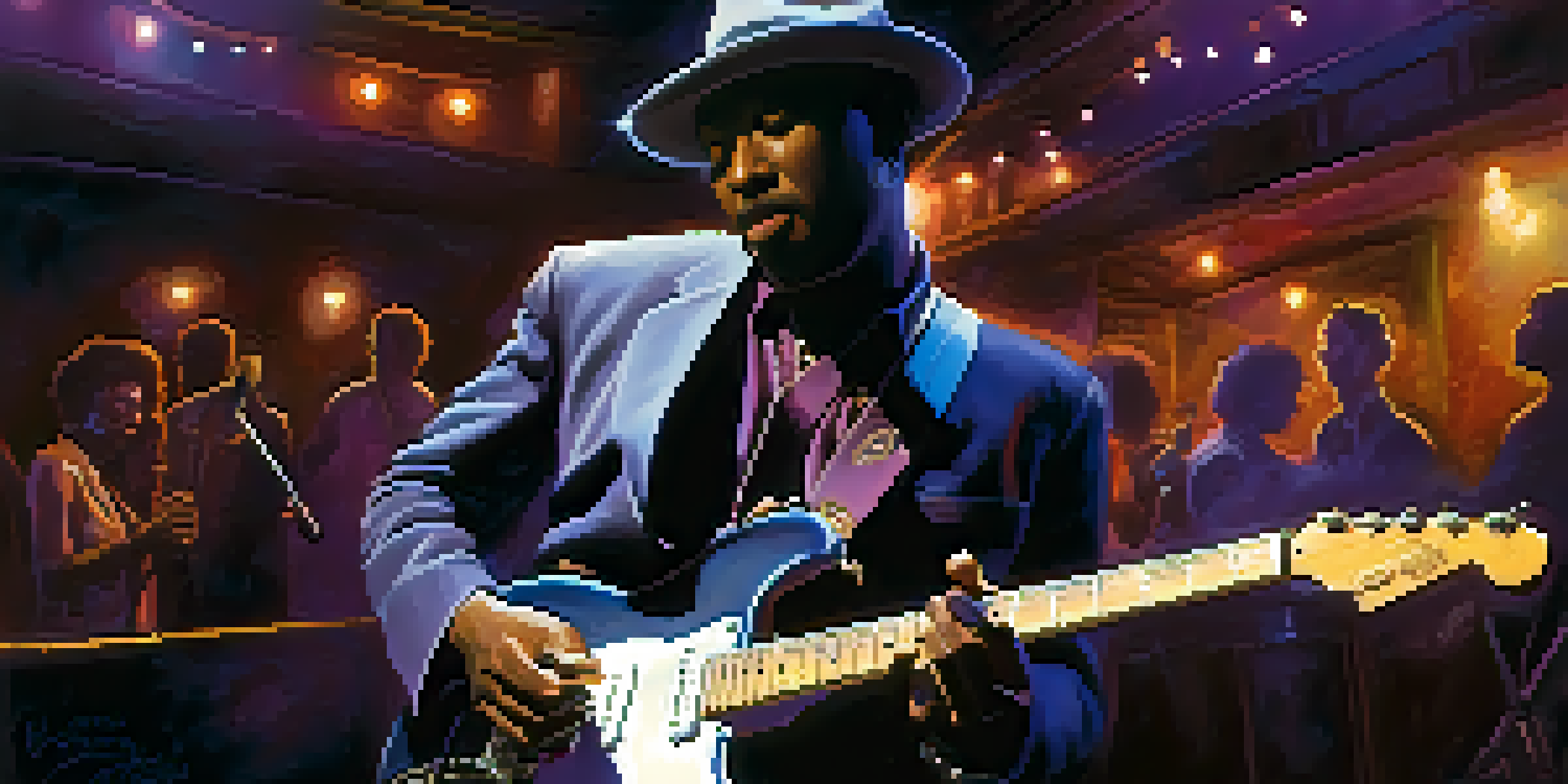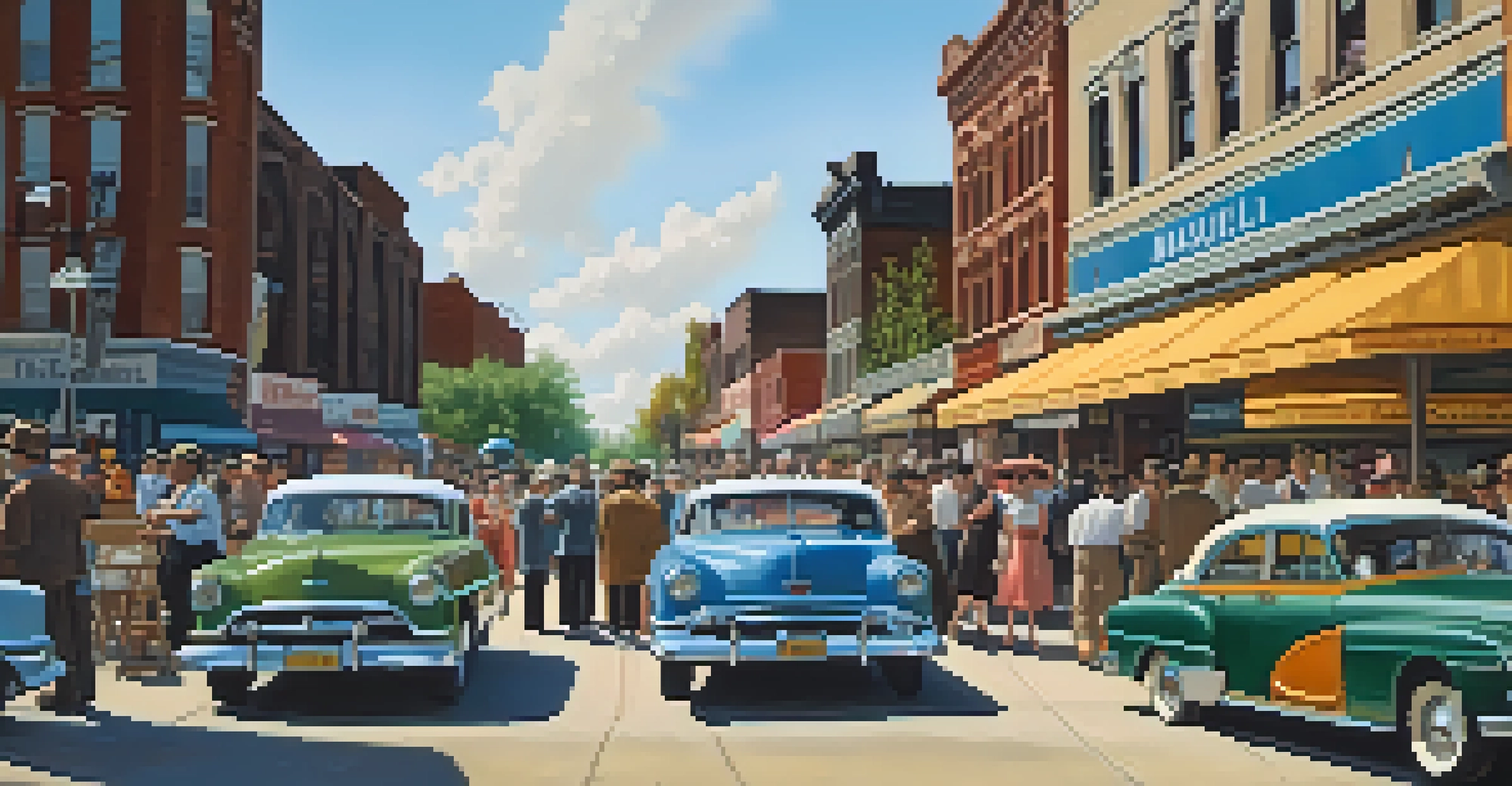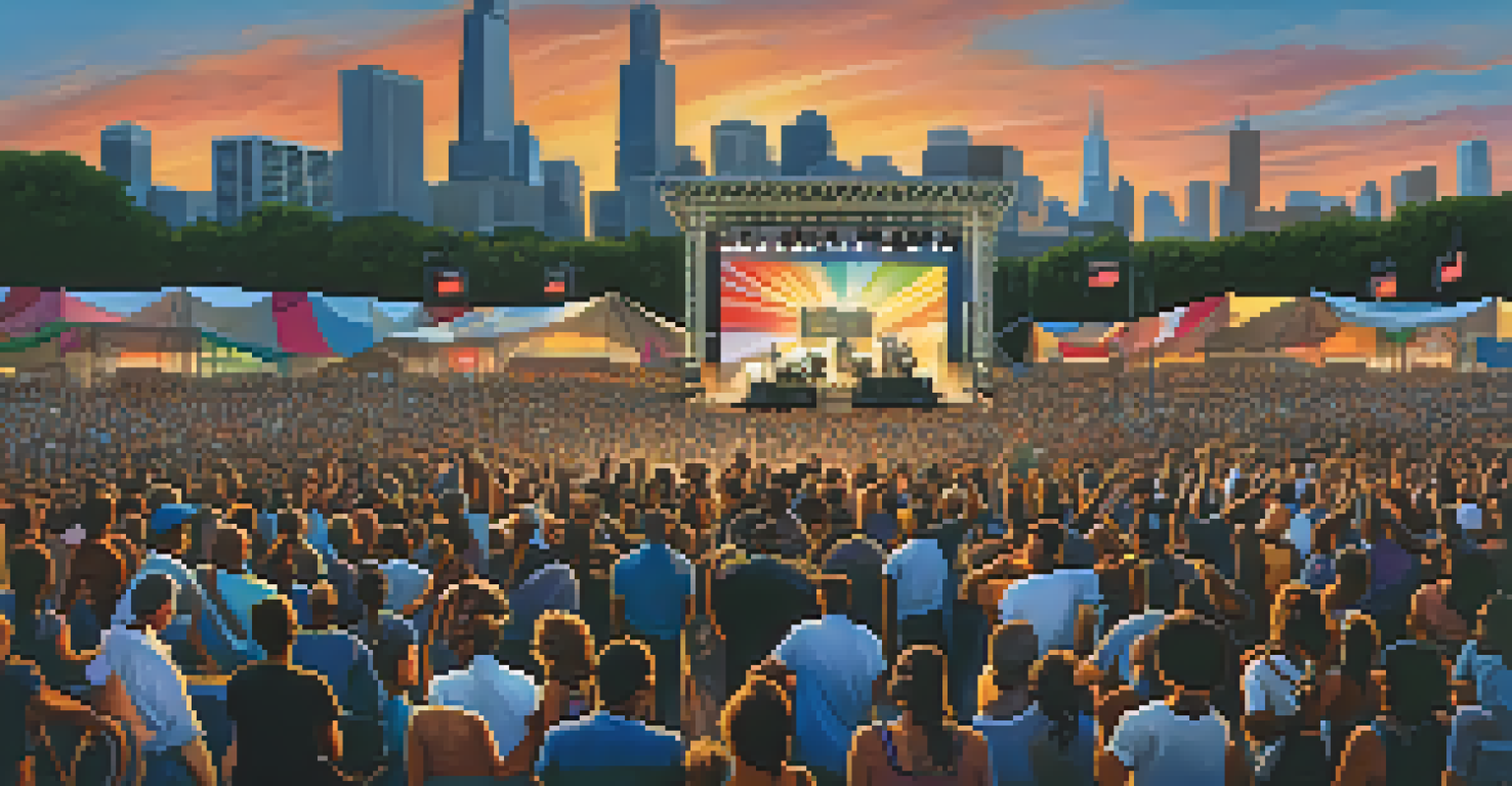The Evolution of Chicago Blues: From Delta Roots to Today

The Delta Origins of Blues Music
Blues music traces its roots back to the Mississippi Delta, where African American communities birthed this soulful genre. The Delta's rich cultural tapestry, influenced by African traditions, gospel, and folk tunes, laid the groundwork for what would become Chicago Blues. Musicians like Robert Johnson and Muddy Waters emerged from this area, crafting songs that spoke to the struggles and joys of everyday life.
The blues is the roots; the rest is the fruits.
The raw emotional quality of Delta Blues is characterized by its use of simple guitar riffs and heartfelt lyrics, often addressing themes of love, loss, and hardship. This style's intimate storytelling connected deeply with audiences, making it a powerful form of expression. As these musicians sought opportunities beyond the Delta, their sounds began to travel northward.
This migration was not just about seeking work; it was also about carrying the cultural essence of the Delta to new places. When these artists arrived in Chicago, they brought with them the heart of the Delta Blues, setting the stage for a musical evolution that would change the landscape of American music forever.
Migration to Chicago: The Great Migration
The Great Migration, which spanned from the 1910s to the 1970s, saw millions of African Americans move from the rural South to urban centers like Chicago. This migration was driven by the search for better economic opportunities and an escape from the oppressive Jim Crow laws of the South. As they settled in Chicago, they brought along their rich musical heritage, including the Delta Blues.

In Chicago, the blues began to evolve, influenced by the city's vibrant nightlife and burgeoning music scene. Venues like the legendary Maxwell Street Market became hotspots for live music, where musicians could showcase their talents. This environment allowed artists to experiment with their sound, blending traditional Delta sounds with elements of jazz and rhythm and blues.
Blues Roots in Mississippi Delta
Blues music originated in the Mississippi Delta, where African American communities combined cultural influences to create a soulful genre.
The blend created a new style, often referred to as Chicago Blues, which featured electrified instruments and more complex arrangements. This transformation not only changed the music but also attracted a diverse audience, laying the groundwork for blues to become a staple in American culture.
The Birth of Chicago Blues: Key Influencers
In the 1940s and 1950s, Chicago Blues truly came into its own, thanks to pioneers like Muddy Waters, Howlin' Wolf, and Willie Dixon. Muddy Waters, often called the 'father of Chicago Blues,' popularized the electric guitar, creating a richer, more dynamic sound. His hit songs like 'Hoochie Coochie Man' showcased the genre's evolving style and deep emotional resonance.
Blues had a baby and they named it rock and roll.
Howlin' Wolf, with his booming voice and commanding stage presence, added a raw intensity to the blues that captivated audiences. His powerful performances and songs like 'Smokestack Lightning' became anthems of the genre, further solidifying Chicago's reputation as a blues capital. Meanwhile, Willie Dixon's songwriting prowess helped shape the sound of numerous blues tracks, establishing him as a key figure in the scene.
Together, these artists not only influenced fellow musicians but also helped to attract national attention to Chicago Blues. Their contributions laid a strong foundation for future generations, ensuring that the genre would continue to thrive and evolve.
The Blues Scene in Chicago: Clubs and Venues
Chicago's vibrant blues scene flourished in the mid-20th century, with iconic venues like the Kingston Mines and Buddy Guy's Legends becoming stages for legendary performances. These clubs provided a platform for both established stars and emerging talent, creating a communal atmosphere for blues lovers. The intimate settings allowed musicians to connect with their audience, fostering a sense of shared experience.
As the blues gained popularity, the clubs also became cultural hubs, attracting diverse crowds and creating a melting pot of musical influences. Patrons would often find themselves immersed in a night filled with electrifying guitar solos, heartfelt lyrics, and improvisational jams that showcased the musicians' talents. This vibrant nightlife helped solidify Chicago's status as the heart of the blues.
Chicago Blues Evolution
As musicians migrated to Chicago, they transformed Delta Blues into a new style that incorporated electric instruments and diverse influences.
Moreover, these venues played a crucial role in the preservation and evolution of the genre, allowing blues music to adapt and thrive. They became breeding grounds for new styles and collaborations, ensuring that Chicago Blues remained a dynamic and relevant force in the music world.
The Influence of Chicago Blues on Rock and Roll
Chicago Blues has had a profound influence on the emergence of rock and roll, shaping the sound of countless artists across generations. Musicians like Eric Clapton, The Rolling Stones, and Jimi Hendrix drew inspiration from the raw energy and emotive storytelling found in blues music. The electrified guitar riffs and rhythmic patterns that defined Chicago Blues laid the groundwork for the rock genre.
In the 1960s, British bands began to cover classic blues songs, bringing them to a new audience and further popularizing the genre. This cross-pollination of musical styles not only introduced blues to a wider demographic but also helped to revive interest in the original artists. As rock and roll continued to evolve, the influence of Chicago Blues remained evident in the work of both established and emerging musicians.
The legacy of Chicago Blues in rock and roll demonstrates the genre's adaptability and enduring appeal. It serves as a reminder of how music can transcend boundaries, connect people, and inspire new creative expressions.
Modern Chicago Blues: Evolution and Innovation
Today, Chicago Blues is a vibrant blend of traditional sounds and modern influences, reflecting the diverse musical landscape of the city. Artists like Shemekia Copeland and Joe Bonamassa continue to push the boundaries, incorporating elements from rock, jazz, and even hip-hop into their music. This evolution highlights the genre's ability to adapt while still honoring its rich history.
Modern musicians are also focusing on the lyrical content, addressing contemporary social issues and personal experiences, which resonates with a new generation of listeners. This shift has opened up the blues to a broader audience, ensuring its relevance in today's music scene. Festivals and events dedicated to Chicago Blues further showcase this evolution, celebrating both classic and contemporary artists.
Global Impact of Chicago Blues
Chicago Blues has inspired a global community, influencing musicians worldwide and contributing to vibrant blues scenes in various countries.
The Chicago Blues scene remains as vibrant as ever, with new talent emerging and established artists continuing to make their mark. This ongoing evolution not only honors the genre's past but also paves the way for future innovations, ensuring that Chicago Blues will thrive for years to come.
The Global Impact of Chicago Blues
Chicago Blues has transcended geographic boundaries, influencing musicians worldwide and creating a global community of blues enthusiasts. Countries like the UK, Germany, and Japan have developed their own vibrant blues scenes, inspired by the sounds that originated in Chicago. This international appreciation has led to collaborations between artists from different cultures, enriching the genre as a whole.
Festivals around the world celebrate Chicago Blues, showcasing both local and international talent. These events not only honor the genre's roots but also highlight its ongoing evolution and relevance in contemporary music. As artists continue to draw inspiration from Chicago Blues, they contribute to its legacy, ensuring that its impact is felt far beyond the city limits.

The global reach of Chicago Blues illustrates the universal nature of music as a form of expression. It serves as a testament to the power of creativity, connecting people across cultures and generations through shared experiences and emotions.